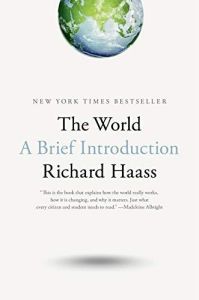Join getAbstract to access the summary!

Join getAbstract to access the summary!
Richard Haass
The World
A Brief Introduction
Penguin Press, 2020
What's inside?
Everything you ever wanted to know about the world – in one convenient package.
Recommendation
Do you ever feel as if you’re lacking context for today’s news? It could be that you’re missing a background in the history that has led to the present moment. Richard Haass, head of the Council on Foreign Relations, explains that a discussion with an engineering student made him realize that few people today learn about history and politics in school, leading to a lack of understanding that can leave them vulnerable to the misleading claims of self-interested politicians and others. Although inspired by a young person, Haass’s enlightening book is for all ages, covering the global history that created today’s conditions and tomorrow’s challenges.
Summary
About the Author
Richard Haass is an American diplomat and the president of the Council on Foreign Relations. He was the director of policy planning at the US State Department and a close adviser to Secretary of State Colin Powell.





















Comment on this summary